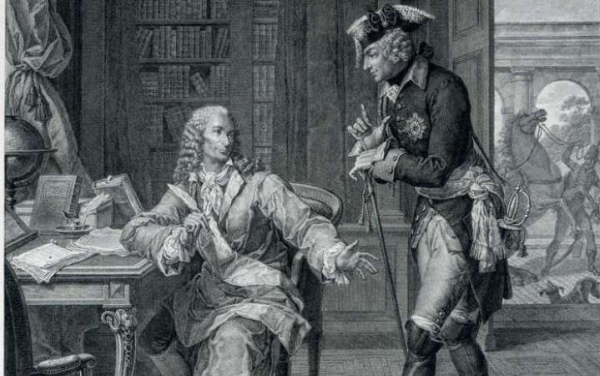At the beginning of March, I posted a letter from Madame du Châtelet as part of the correspondence written by herself and Voltaire from 1735 to 1738, all of which I selected and translated. I am now in lockdown during the coronavirus pandemic and I have Émilie’s correspondence on my desk--but Voltaire's has been returned to storage at the Fisher Library at Sydney University. Online searches cannot restore it to me (he wrote 15,000 letters after all!). Here is my solution. I have access to a selection of his letters: Voltaire in His Letters by S.G. Tallentyre (G.P. Putnam Sons, 1919) and it is out of copyright. For now, why not bring you Tallentyre's translations from Voltaire's side and mine from Émilie’s?
The letter I posted in March was from Émilie to the Comte d'Argental in 1737, desperately lamenting Voltaire's departure to Holland. She was terrified that he would succumb to the blandishments of the 'philosopher prince', Frederick of Prussia (later Frederick the Great) and go to Potsdam. So it's Voltaire's turn: here is some of a letter to Frederick written at that time, with translation by Tallentyre.
I examine man. We must see if, of whatsoever materials he is composed, there is vice and virtue in them. That is the important point with regard to him—I do not say merely with regard to a certain society living under certain laws: but for the whole human race; for you, sir, who will one day sit on a throne, for the wood-cutter in your forest, for the Chinese doctor, and for the savage of America. Locke, the wisest metaphysician I know, while he very rightly attacks the theory of innate ideas, seems to think that there is no universal moral principle. I venture to doubt, or rather, to elucidate the great man's theory on this point. I agree with him that there is really no such thing as innate thought: whence it obviously follows that there is no principle of morality innate in our souls: but because we are not born with beards, is it just to say that we are not born (we, the inhabitants of this continent) to have beards at a certain age ?
We are not born able to walk: but everyone born with two feet will walk one day. Thus, no one is born with the idea he must be just: but God has so made us that, at a certain age, we all agree to this truth.
It seems clear to me that God designed us to live in society—just as He has given the bees the instincts and the powers to make honey: and as our social system could not subsist without the sense of justice and injustice, He has given us the power to acquire that sense. It is true that varying customs make us attach the idea of justice to different things. What is a crime in Europe will be a virtue in Asia, just as German dishes do not please French palates: but God has so made Germans and French that they both like good living. All societies, then, will not have the same laws, but no society will be without laws.

